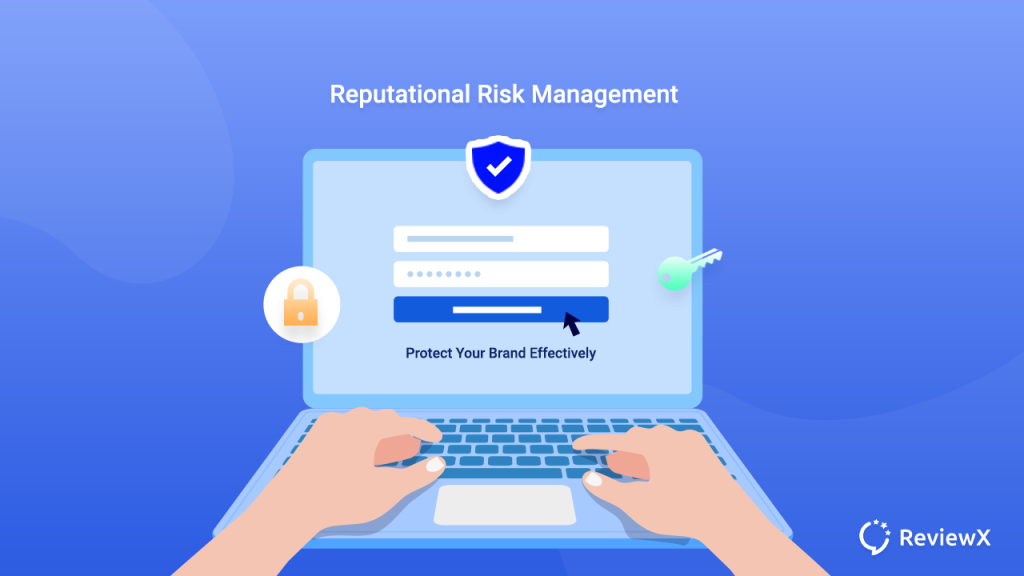
Reputational Risk: How To Help Mitigate Damage To Your Brand
- Published
- ReviewX Team
Reputational risk refers to the potential damage to a brand’s reputation caused by various factors, such as negative publicity, legal issues, or data breaches. This type of risk can have far-reaching consequences, affecting a company’s bottom line and its relationship with customers, employees, and stakeholders. Therefore, it’s crucial for businesses to take proactive measures to mitigate reputational risk and safeguard their brand’s image.

In this blog, we’ll explore some reputational risk management strategies that companies/brands can use to protect themselves from reputational damage and maintain a positive public perception.
💡 Why Is Reputational Risk Management So Important?
Reputation risk management refers to safeguarding and enhancing the reputation of an organization. This is an important aspect because a brand’s reputation is an invaluable asset. Analyzing reputational risks enables you to identify potential hazards to your business.
However, the impact of brand risk can be long-lasting and severe, potentially jeopardizing the financial stability and even the survival of a brand. On the other hand, a strong reputation can attract and retain customers, employees, and investors, while also helping a business navigate crises and setbacks.
👨🏻🏫 Reputational Risk: 3 Common Risks To Consider
In today’s fast-paced digital world, negative news has the potential to spread rapidly. For financial firms, the risk of negative events extends beyond investors expressing dissatisfaction with returns. Here are 3 scenarios that could have adverse effects on your organization:
In today’s fast-paced digital world, negative news has the potential to spread rapidly. For financial firms, the risk of negative events extends beyond investors expressing dissatisfaction with returns. Here are 3 scenarios that could have adverse effects on your organization:
👨🏻💻 Employee Legal Issues: If someone associated with your company is in the news for alleged criminal activity, it may affect your company’s reputation, particularly if the individual holds a leadership position or is in a public-facing role and is accused of financial misconduct.
For example, In 2016, Wells Fargo’s retail banking unit was accused of opening over a million unauthorized accounts and selling unneeded products. This resulted in a fine of $185 million by the Consumer Financial Protection Bureau, the Office of the Comptroller of the Currency, and the City and County of Los Angeles.

Wells Fargo was later fined another $1 billion and paid $575 million to settle legal claims. The scandal caused Wells Fargo’s stock price to fall 13%, costing them around $20 billion. The CEO, John Stumpf, resigned in October, and the head of the retail bank, Carrie Tolstedt, retired. Four senior managers were also terminated. The scandal badly damaged Wells Fargo’s reputation.
🌟 Disregard For Employee Welfare: Companies in any industry risk damaging their reputation if allegations of unfair treatment of employees arise. For instance, the #MeToo movement in 2018 and 2019 resulted in companies facing reputational damage due to claims that they ignored or condoned employee harassment and other inappropriate conduct.
📊 Data Breaches: Cybersecurity breaches can harm the reputation of any business. For financial services companies, the risk is even greater, as their clients rely on them to provide the highest level of security to safeguard their personal information and financial resources.
📣 Minimizing Reputational Risk Management: 6 Best Strategies
Completely avoiding reputational damage is impossible, and even the most robust controls may not safeguard your brand. Nevertheless, you can count on the following strategies to minimize your vulnerability and emerge stronger from a negative event.
🛡️ Safeguard Your Brand From Data Breaches
Reputational risk can arise from data breaches, which are becoming increasingly common due to cyberattacks. Promptly informing those affected, taking accountability, and implementing remedial measures can limit the negative impact on your reputation. Preventing data breaches involves:
✅ Educating stakeholders on cyber safety practices
✅ Implementing protection policies and procedures
✅ Updating security controls, and
✅ Using advanced threat analytics
Moreover, hiring encryption experts, setting up a response team, and obtaining cyber insurance can also mitigate reputational risk. These proactive measures demonstrate your commitment to safeguarding sensitive information, serving as a reputation shield.
👨🏻💻 Monitor Customer Service Carefully To Prevent Mishaps
Reputational risk is prevalent in today’s world of social media. Negative reviews can cause permanent digital damage, making it difficult to recover. One way to prevent this is by providing customer service training and empowering employees to deal with complaints promptly and professionally.

It’s also essential to hire the right people who possess both the necessary hard skills and a customer-centric attitude. Remember, customers always remember how you made them feel.
🤝🏻 Ensure Employee Satisfaction To Mitigate Reputational Risk
Reputational risk can come from unhappy employees who know a lot about your company’s culture and practices. To avoid this risk, treat your employees fairly and ensure your people practices are above reproach. Check if your employees are happy and find ways to boost their satisfaction.
To keep your employees happy and improve your reputation, have frequent check-ins with them. Group meetings and one-on-one meetings are both helpful. Take what your employees say seriously and offer them perspective. If you can be a leader of integrity and fairness, even in difficult situations, you may boost your company’s reputation.
Happy employees are important not just because it’s the right thing to do, but also because they are more likely to treat colleagues and customers well, which can boost your company’s reputation as a good one.
🌟 Showcase Your Company Values
Make sure your website and marketing materials reflect your company’s values. Do your employees believe in these values? Do their actions match them? This is important to avoid reputational risk.

If people think your company’s values are only for show, it can be a reputational risk. You can avoid this by making your values operational. Start by modeling your values and having senior people do the same. If you say employees are your most valuable asset, show it by how you treat them. Identify any misalignment between values and behavior and take steps to correct it.
Incorporate your values into every aspect of the company, from employee selection to performance management and resource allocation. This sends a clear message that your values are not just for show.
⭐ Practice Ethical Conduct With Effectiveness
Having lapses in ethics can cause reputational risk. To avoid this, create clear workplace practices and policies. Make sure your company has a code of conduct to guide employee behavior.
Know what’s appropriate when giving or accepting gifts from clients, suppliers, or other third parties. If working with overseas companies, be aware of their gift-giving laws. Ethical slips, whether intentional or unintentional, can result in reputational risk and damage.
⚡ Manage External Reputational Risk Appropriately
Reputational risk can come from outside the company, from partners, suppliers, or other third parties. You can’t always predict these risks, but it’s important to take action to reduce negative effects. Know who you’re working with.
If your reputation is damaged, even if it’s fixed later, it can harm your brand’s credibility. By using the tips in this article, you can help your company avoid and reduce reputational risk. This may even save your brand’s reputation.
🎯 Mitigate Reputational Risk & Protect Your Brand Now
Maintaining a positive brand reputation is essential in today’s competitive world. Reputational risk can come from many sources, both within and outside of your company. By taking proactive steps to mitigate these risks and protect your brand, you can ensure that your business continues to thrive.
Remember to keep your ear to the ground, know who you’re working with, and use the tips outlined in this article to help you protect your brand’s reputation. Hope you enjoyed the blog. And to get more latest tricks and tips, feel free to subscribe to our blog and join our Facebook Community.
Table of Contents
Increase sales with customer reviews
Showcasing customer experiences helps build trust and drive higher sales.
Related Articles
![10 Best WooCommerce Review Plugins for Your Store [FREE & Paid]](https://reviewx.io/wp-content/uploads/2025/03/10-Best-WooCommerce-Review-Plugins-for-Your-Store-FREE-Paid-300x169.jpg)
10 Best WooCommerce Review Plugins for Your Store [FREE & Paid]
Choosing the best review plugin for your store can be a hassling job. You have to do a

Free vs. Paid WooCommerce Reviews Plugin: Which One to Use?
Review plugins make your WooCommerce work easier and WordPress gives you numerous options in the market. Some of

WooCommerce Review Plugins: Why It Matters & What to Look for!
Having reviews has become a norm as nearly 95% of consumers read online reviews before buying. So, it’s